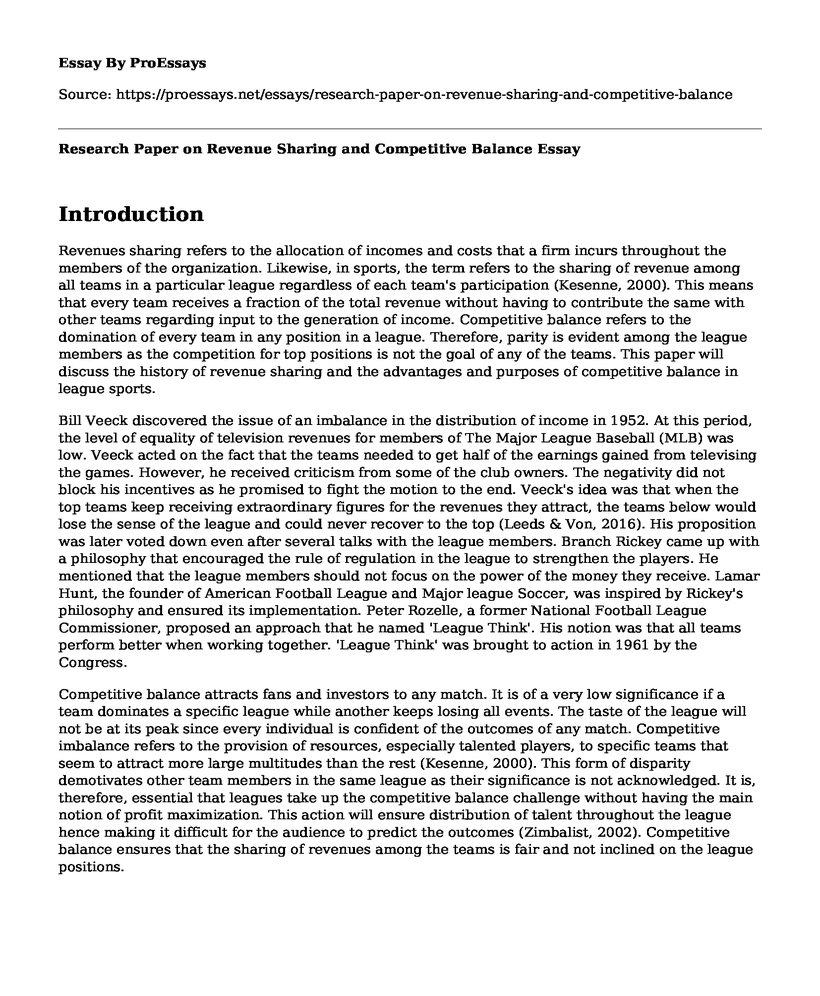Introduction
Revenues sharing refers to the allocation of incomes and costs that a firm incurs throughout the members of the organization. Likewise, in sports, the term refers to the sharing of revenue among all teams in a particular league regardless of each team's participation (Kesenne, 2000). This means that every team receives a fraction of the total revenue without having to contribute the same with other teams regarding input to the generation of income. Competitive balance refers to the domination of every team in any position in a league. Therefore, parity is evident among the league members as the competition for top positions is not the goal of any of the teams. This paper will discuss the history of revenue sharing and the advantages and purposes of competitive balance in league sports.
Bill Veeck discovered the issue of an imbalance in the distribution of income in 1952. At this period, the level of equality of television revenues for members of The Major League Baseball (MLB) was low. Veeck acted on the fact that the teams needed to get half of the earnings gained from televising the games. However, he received criticism from some of the club owners. The negativity did not block his incentives as he promised to fight the motion to the end. Veeck's idea was that when the top teams keep receiving extraordinary figures for the revenues they attract, the teams below would lose the sense of the league and could never recover to the top (Leeds & Von, 2016). His proposition was later voted down even after several talks with the league members. Branch Rickey came up with a philosophy that encouraged the rule of regulation in the league to strengthen the players. He mentioned that the league members should not focus on the power of the money they receive. Lamar Hunt, the founder of American Football League and Major league Soccer, was inspired by Rickey's philosophy and ensured its implementation. Peter Rozelle, a former National Football League Commissioner, proposed an approach that he named 'League Think'. His notion was that all teams perform better when working together. 'League Think' was brought to action in 1961 by the Congress.
Competitive balance attracts fans and investors to any match. It is of a very low significance if a team dominates a specific league while another keeps losing all events. The taste of the league will not be at its peak since every individual is confident of the outcomes of any match. Competitive imbalance refers to the provision of resources, especially talented players, to specific teams that seem to attract more large multitudes than the rest (Kesenne, 2000). This form of disparity demotivates other team members in the same league as their significance is not acknowledged. It is, therefore, essential that leagues take up the competitive balance challenge without having the main notion of profit maximization. This action will ensure distribution of talent throughout the league hence making it difficult for the audience to predict the outcomes (Zimbalist, 2002). Competitive balance ensures that the sharing of revenues among the teams is fair and not inclined on the league positions.
Conclusion
In summary, revenue sharing is an important factor that guarantees every team a fair share of the income generated. Likewise, competitive balance determines the productivity of a particular league since the predictability of the outcome is not an easy guess. The two exercises should be implemented in most leagues to fortify the worth of the league and the teams.
References
Kesenne, S. (2000). Revenue sharing and competitive balance in professional team sports. Journal of Sports Economics, 1(1), 56-65.
Leeds, M. A., & Von Allmen, P. (2016). The Economics of Sports: International Edition. Routledge.
Zimbalist, A. S. (2002). Competitive balance in sports leagues: An introduction.
Cite this page
Research Paper on Revenue Sharing and Competitive Balance. (2022, Jun 19). Retrieved from https://proessays.net/essays/research-paper-on-revenue-sharing-and-competitive-balance
If you are the original author of this essay and no longer wish to have it published on the ProEssays website, please click below to request its removal:
- Essay Example on Trading Options
- Analysis of Market Forces: Demand and Supply and Quantitative Demand Analysis
- Macroeconomics: Assignment Example
- Unions: Negotiating From Strength for Employee Benefits - Essay Sample
- Calculating Unemployment - Essay Sample
- Essay Example on Monopolies: A Review of Competition & Regulation
- Essential Soft Skills for Workplace Success: A Comprehensive Evaluation







